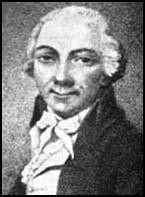Maurice Margarot
| Maurice Margarot | |
|---|---|
 |
|
| Born | 1745 Devon, England |
| Died | 1815 London |
| Nationality | British |
| Occupation | merchant |
| Known for | London Corresponding Society, Scottish Martyrs |
Maurice Margarot (1745–1815) is most notable for being one of the founding members of the London Corresponding Society, a radical society demanding parliamentary reform in the late eighteenth century.
Maurice Margarot was the son of a wine and general merchant, also named Maurice, and his wife Catherine. Born in 1745, he lived most of his childhood in London, but his father's work caused the family to travel widely: he was baptized in Portugal at the British Factory Chaplaincy, in Lisbon, on 27 August 1749; educated at the University of Geneva in Switzerland. He and his father were both involved in a campaign to free John Wilkes from prison in 1769.
Margarot followed his father in business and political interest. Living in France during the French Revolution in 1789, Margarot had acquaintances among the revolutionary leaders. He was inspired (as well as further radicalized) by the French people and the revolution, and returned to England in 1792, where he followed Thomas Hardy into the London Corresponding Society to further the cause of reform. In May 1792, the Society elected Margarot as its chairman. Margarot's signature, along with Hardy's, were present on all the early publications by the London Corresponding Society, and this continued for several years. The publications called for fiscal and electoral reform as well as shorter parliaments. In November 1793, Margarot and Joseph Gerrald were chosen to attend the Edinburgh Convention organized by the Friends of the People Society - ostensibly a meeting for reformers, but seen as a threat and an attempt to establish an illegal government by William Pitt the Younger's ministry at the time. Margarot and Gerrald stood out during the debate and authorities selected them to be charged with sedition.
In December 1793, Margarot was arrested and charged with involvement in seditious practices. The trial in January 1794 was notable due to mob demonstrations in Margarot's favor.
At his trial, Margarot defended himself with a speech described by the judge, Lord Braxfield, as itself being "sedition". He was found guilty, and along with four other radicals (later known as the "Scottish Martyrs to Liberty") was transported to New South Wales in May 1794 in the convict ship Surprize.
...
Wikipedia
